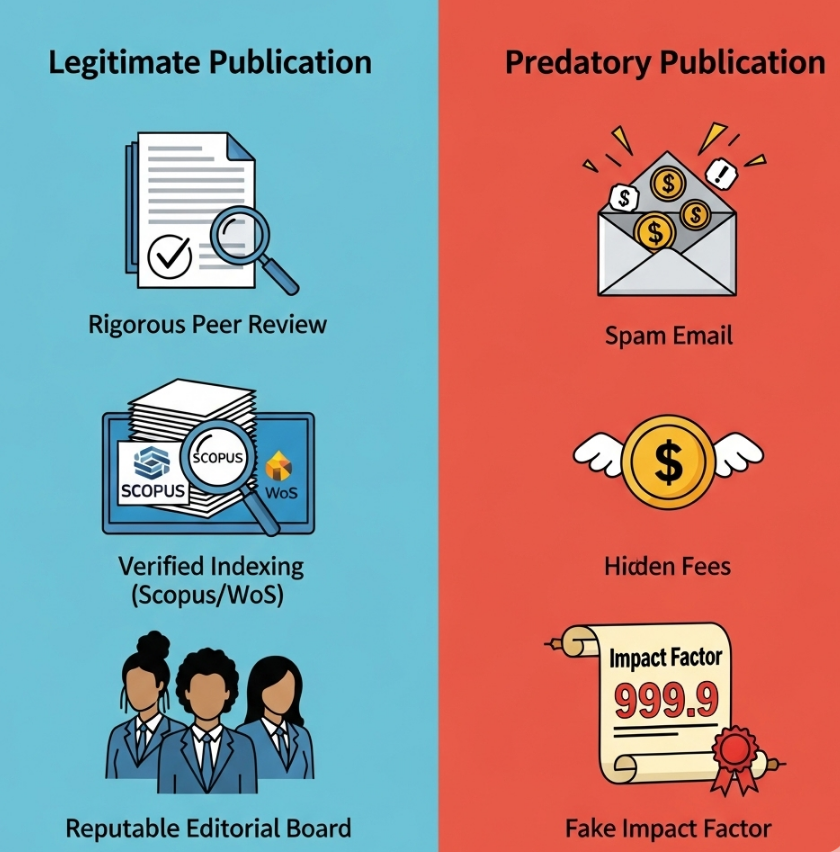

209 views||Release time: Sep 29, 2025
In the high-stakes world of academic publishing, the pressure to "publish or perish" is immense. Unfortunately, this pressure has fueled the rise of a deceptive industry: predatory publishing. These entities—often called "predatory journals" or "predatory conferences"—exploit researchers by charging publication fees without providing the legitimate services of a scholarly publisher, such as robust peer review and proper indexing.

Falling for one of these schemes can damage your reputation, cost you money, and result in your hard work being published in a disreputable venue. This guide provides a clear checklist of red flags to help you distinguish between legitimate opportunities and predatory traps.
A predatory journal prioritizes profit over scholarship. Here’s how to spot one:
1. Aggressive and Unprofessional Email Solicitations You receive a very flattering but non-specific email inviting you to submit a paper. Watch for:
Language like "We are great admirers of your esteemed work."
Grammatical errors and overly casual tone.
The email is not addressed to you by name (e.g., "Dear Esteemed Author").
2. The Journal's Website is a Major Clue
Unprofessional Design: The website looks cheap, is difficult to navigate, and contains spelling or grammar mistakes.
Vague or Overly Broad Scope: A journal claiming to cover "all aspects of science, engineering, and medicine" is not a specialist journal; it's a catch-all for submission fees.
Fake Metrics: The website boasts a high "Impact Factor" from an unknown metric body (e.g., "Global Impact Factor"). A legitimate Journal Impact Factor (JIF) is only provided by Clarivate's Journal Citation Reports (JCR).
3. The Editorial Board is Suspicious
Lack of Expertise: The "editors" listed have no visible expertise in the journal's field.
** unverifiable Members:** The members are not affiliated with any reputable university, or if they are, they do not list the journal on their official university profiles. Sometimes, experts are listed without their knowledge or consent.
4. Promises of Extremely Rapid Publication Legitimate peer review takes months. A journal that promises "publication within 72 hours" of submission is bypassing peer review entirely. This is one of the biggest red flags.
5. Lack of Transparency About Fees The Article Processing Charges (APCs) are hidden or only revealed after your paper has been accepted. Legitimate open-access journals are upfront and clear about their publication fees.
Predatory conferences are often more interested in your registration fee than your research.
1. Unsolicited, Flattering Invitations You receive an email inviting you to be a "keynote speaker" or "session chair" at a conference you have never heard of, in a field you are not an expert in.
2. The Conference Name is Vague and Prestigious-Sounding Look for generic names that sound important but mean little, such as "The International Congress on Science, Innovation, and Technology."
3. The Agenda and Speakers are Vague The conference is only a few months away, but the website has no detailed program, no confirmed keynote speakers, or lists speakers who have not consented to participate.
4. The Proceedings Publisher is Not Reputable The conference makes vague promises about indexing in Scopus or EI Compendex but provides no evidence from past years. Check if previous proceedings were actually published and indexed as promised. A claim of "submission to" these databases is not a guarantee of inclusion.
5. The Event is Run by a Known Predatory Organizer Some organizations run hundreds of low-quality conferences. If you are suspicious, a quick search for the organizer's name plus "predatory" can be very revealing.
Before you submit or register, take these proactive steps:
Check Whitelists and Blacklists: Consult resources like the Directory of Open Access Journals (DOAJ) for legitimate open-access journals. While the original "Beall's List" of predatory publishers is now archived, its principles are still widely used to identify predatory behavior.
Verify Indexing Claims: Go directly to the Scopus and Web of Science websites and search to see if the journal or past conference proceedings are actually indexed. Do not trust the claims on the conference's own website.
Consult Your Community: This is your best defense. Ask your supervisor, your university librarian, and senior colleagues. They have the experience to recognize reputable venues and warn you away from predatory ones.
Conclusion
Your research and your professional reputation are your most valuable assets. In the current academic climate, it is every researcher's responsibility to be vigilant. By taking the time to critically evaluate journals and conferences before submitting your work, you can protect your credibility and ensure your contributions are a part of the legitimate, trusted body of global knowledge.